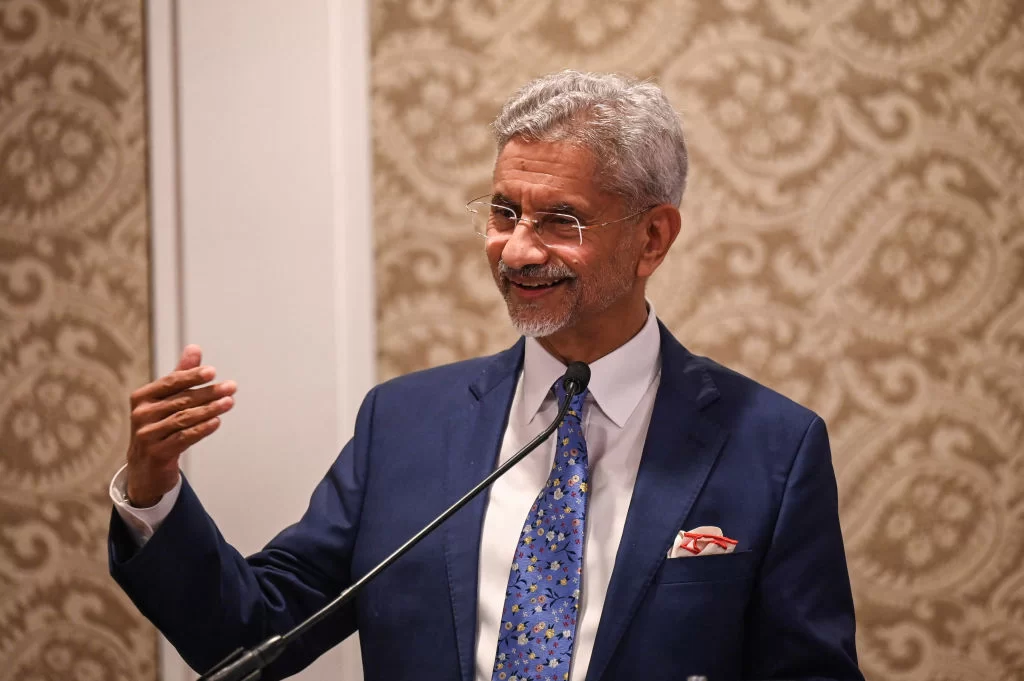- Thursday, April 03, 2025
Highlighting Delhi’s ‘Neighborhood First’ policy, the minister referred to inviting leaders of the Maldives, Sri Lanka, Bangladesh, Bhutan, Nepal, Seychelles and Mauritius to the swearing-in ceremony of PM Modi.

By: Shubham Ghosh
“BHARAT FIRST” and “Vasudhaiva Kutumbakam” (the world is one family) will be the two guiding axioms of India’s foreign policy, external affairs minister Subrahmanyam Jaishankar said on Tuesday (11) as he began his second term in office.
The focus of the new government will be to position India Mas a “Vishwa Bandhu” (friend of the world) in a turbulent and divided world facing conflicts and tensions.
Jaishankar, 69, was among the senior leaders of India’s ruling Bharatiya Janata Party (BJP) including Rajnath Singh, Amit Shah, Nitin Gadkari and Nirmala Sitharaman who retained the ministries they handled in the previous government.
“Looking ahead, definitely, I think the two axioms that the prime minister has given us — Bharat First and Vasudhaiva Kutumbakam — will be the two guiding axioms of Indian foreign policy,” he said.
Read: Third Modi government takes charge: Here’s full list of ministers
“Together, we are very confident it will position us as ‘Vishwa Bandhu’ (friend of the world) ….in a very turbulent world, in a very divided world, a world of conflicts and tensions,” he told reporters.
“It would actually position us as a country which is trusted by many, whose prestige and influence will grow, whose interests will be advanced,” he said. Jaishankar also welcomed his ministerial colleagues Pabitra Margherita and Kirti Vardhan Singh to the ministry of external affairs (MEA).
Read: Jaishankar reacts to Biden’s ‘xenophobic’ remark: ‘India has been very open’
Margherita, a member of the Rajya Sabha or Upper House of the Indian parliament from the north-eastern state of Assam, and Singh, who won the recent general elections from the northern state of Uttar Pradesh, are the new ministers of state in the MEA.
“It is for me an immense honour, a very great privilege to be once again given the responsibility of leading the ministry of external affairs. You all know that in the last term, this ministry actually performed exceptionally well,” Jaishankar said.
“It rose to many challenges. We delivered where the G20 presidency was concerned,” he added.
Highlighting the importance of India’s “Neighborhood First” policy, Jaishankar referred to New Delhi inviting leaders of the Maldives, Sri Lanka, Bangladesh, Bhutan, Nepal, Seychelles and Mauritius to the swearing-in ceremony of prime minister Narendra Modi and his federal council of ministers.
“All our neighbours came (to the swearing-in) and the prime minister himself met all of them. I can tell you, they are leaving with a sense that our neighbouring relationships will be the first priority and will be the overriding priority of the Modi government,” he said.
Asked whether the new government will push for a permanent seat for India in the United Nations Security Council, Jaishankar did not give a direct reply and said the country’s influence is steadily growing.
“I think for us the role of India, the influence of India that has been steadily growing, not just in terms of our own perception, but if you see what other countries are saying about us,” he said.
“They too feel that India is truly their friend, they have seen how in times of trouble if there was one country that stood with the Global South, it is India,” he added.
“They have seen that during our presidency of the G20, we took forward the membership of the African Union. The world believes in us and our responsibilities are increasing,” Jaishankar said.
As the external affairs minister since 2019, he displayed with confidence his ability to clearly articulate India’s positions on a range of complex issues on the global stage. From blunting western criticism of New Delhi’s procurement of crude oil from Moscow in the wake of the war in Ukraine to crafting a firm policy approach to deal with an assertive China, Jaishankar emerged as one of the leading ministers with an impressive record of performance in Modi’s previous government.
(With PTI inputs)